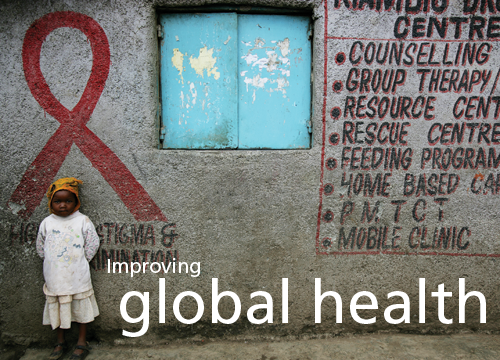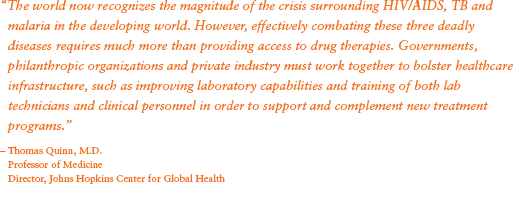
An infant in Lesotho, a mother in Thailand and a teenager in Hungary are just a few of the human faces of the global HIV/AIDS pandemic that afflicted an estimated 33 million people in 2007. Of those suffering, the vast majority live in developing countries. Most patients would benefit from antiretroviral (ARV) therapy, but only about 20 percent actually receive it. The problem largely stems from a lack of basic healthcare infrastructure, including substandard facilities and severe shortages of trained clinicians and laboratory workers. Compounding the problem is tuberculosis (TB), a disease once considered controlled that is now re-emerging to prey upon HIV/AIDS patients with weakened immune systems. TB is also evolving into even deadlier drug-resistant strains that must be identified and treated to prevent a global outbreak.

In the developing world, BD’s multi-dimensional approach to tackling HIV/AIDS positions the Company to make a significant impact in the fight against this disease and its deadly companion, tuberculosis (TB). Recognizing that no single technology or company will defeat these diseases, BD has mobilized on many fronts – calling on its leading technology, expertise, experience, global presence and strong relationships with governmental and nongovernmental organizations to address problems that limit access to healthcare services in the developing world.
BD continues to invest in products and technologies specifically designed to meet the needs of developing countries, emphasizing affordability. CD4 testing, which measures the deterioration of the immune systems of people living with HIV, is used to determine the need for antiretroviral (ARV) therapy and to monitor its progress. Laboratories in more than 120 developing countries are currently using BD FACSCount and BD FACSCalibur flow cytometers for CD4 monitoring. To improve the effectiveness of these technologies, BD has trained more than 3,400 laboratory workers in 57 countries through BD Good Laboratory Practice workshops.
In a major commitment to strengthen laboratory practices in African countries severely affected by HIV/AIDS and TB, BD entered into an agreement in 2007 with the U.S. President’s Emergency Plan for AIDS Relief (PEPFAR), which is the largest international public health initiative directed at a single disease that any nation has ever undertaken. Under the agreement, BD and PEPFAR have each committed up to $9 million in in-kind associate support and financial resources toward this five-year public-private partnership to bolster training and improve diagnostic testing critical to managing the care of HIV/AIDS patients.
In the face of increasing drug-resistant forms of TB, rapid culture and drug susceptibility testing are more important than ever. However, TB culture testing is widely underutilized. In addition, the most commonly used method takes up to six weeks for results. This delay could be deadly for infected people in the developing world. The BD BACTEC MGIT System dramatically shortens mycobacterial culture recovery time, typically to 10-14 days.